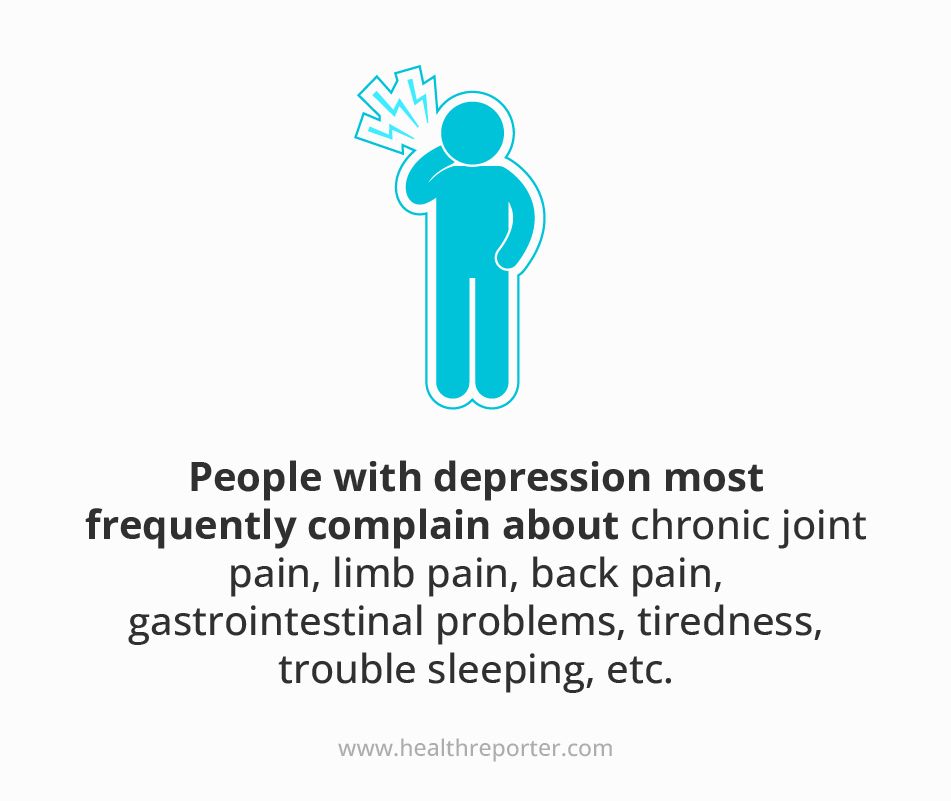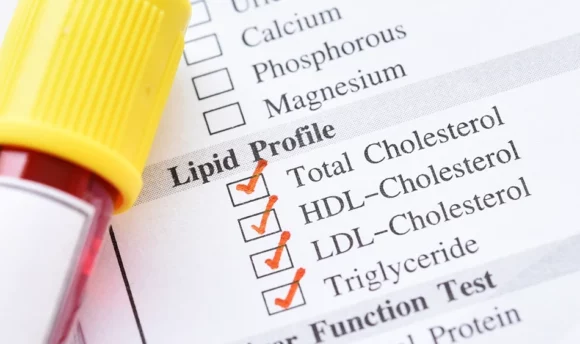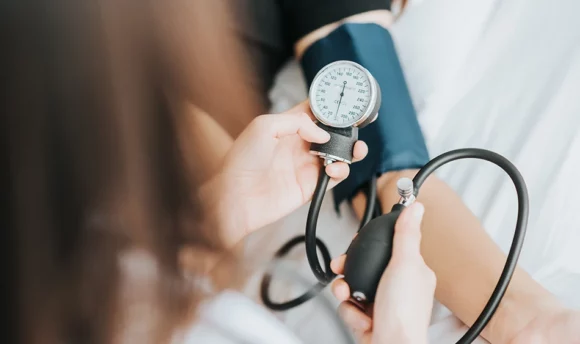Does Anxiety Cause High Blood Pressure?
High blood pressure is a fairly common health problem that affects millions of people around the world. There are many factors that can affect your blood pressure, but is anxiety one of them? Let’s discuss anxiety, blood pressure, and how you can manage both.

High blood pressure, also known as hypertension, is a common chronic disease. If left untreated, this disease can lead to many long-term health problems.
Blood pressure can be impacted by your mood and feelings, including anxiety. Many people experience anxiety often. This can range from mild anxiety symptoms to severe anxiety disorders.
But can feelings of anxiety make you develop hypertension? And what can you do to control high blood pressure and anxiety in your everyday life? Keep reading this article to find out the answers to these questions and more.
Does Anxiety Cause High Blood Pressure?
Anxiety doesn’t cause chronic high blood pressure, but it can increase a person’s blood pressure temporarily.
These short-term spikes in your blood pressure can still cause damage, especially if you have frequent anxiety. Recurrent episodes of high blood pressure can lead to damage that is similar to chronic hypertension.
Even young adults can experience spikes in their blood pressure as a result of anxiety and stress caused by work and studying. Some people also experience white coat hypertension. This happens when a doctor’s appointment triggers feelings of anxiety and raises your blood pressure.
These fluctuations can affect your heart health, especially if you don’t learn techniques to manage your anxiety. People with chronic anxiety also have a higher risk of high blood pressure readings at different times of the day.
Struggling with anxiety can also drive you to harmful behaviors that increase your risk of hypertension. These behaviors include smoking, drinking too much alcohol, and overeating.
High Blood Pressure Symptoms
Unfortunately, the physical symptoms of high blood pressure can be hard to notice. In fact, many people with chronic high blood pressure don’t show any symptoms until they develop complications.
Symptoms of hypertension can include headache, blurred vision, dizziness, nosebleeds, irregular heartbeats, and chest pain. In many cases, these symptoms only appear when you develop a hypertensive crisis, which is a medical emergency.
Elevated blood pressure harms many organs in your body, especially if it’s left untreated for a long time. Chronic high blood pressure increases your risk of suffering from different health complications.
The consequences of untreated hypertension include strokes, heart attacks, heart disease, kidney disease, circulation problems, vision loss, and even dementia.
How much does anxiety raise BP?
When you’re feeling anxious, your sympathetic nervous system triggers a “fight or flight” response and releases certain hormones. These hormones include adrenaline and cortisol, which increase your blood flow so you can push more blood to your vital organs. This process also increases your heart rate, blood pressure, and breathing rate. Once anxiety passes, your parasympathetic nervous system is meant to stop this response.
Anxiety-induced increases in your blood pressure can vary a lot. Intense anxiety attacks can lead to dramatic heights, yet everyone may experience different changes in their blood pressure when they feel anxious. This can also vary depending on the level of anxiety that you’re feeling on a particular occasion.
The exact relationship between chronic anxiety and hypertension isn’t fully understood. But according to research, white coat syndrome can raise blood pressure by approximately 10 points or more. This may be similar to other instances of anxiety-induced hypertension.
How to Calm Anxiety
Fortunately, there are many steps you can take to get anxiety under control.
Leading a healthier lifestyle can help manage anxiety. Improving the quality of your sleep, eating a healthy and balanced diet, and exercising regularly are all great tools to treat anxiety.
Relaxation techniques also help keep anxiety under control. There are many different strategies you can try, such as yoga, meditation, aromatherapy, journaling, deep breathing techniques, and mindfulness. Health tips that work for someone else may not work for you. It’s important to try different things until you find a strategy that works best.
You should seek medical assistance if you have severe or recurrent symptoms of anxiety, such as chest pain. Uncontrollable and debilitating worrying can be a sign of an anxiety disorder. This is different from occasional worrying or everyday stress.
According to experts, generalized anxiety disorder (GAD) causes persistent anxiety symptoms that can interfere with your work, studying, and even personal life.
In some cases, treating an anxiety disorder requires both lifestyle changes and medications. Selective serotonin reuptake inhibitors (SSRIs) are often prescribed to get severe symptoms under control, and psychological therapy can lead to enduring relief.
Can Stress Cause High Blood Pressure?
Just like anxiety, stress can be a part of everyday life that can affect your blood pressure. Similar to anxiety, stress triggers certain changes that can lead to hypertension.
Stress puts your body in a “fight or flight” mode and releases hormones that raise your blood pressure. These changes are temporary but can still damage your health.

On its own, stress is unlikely to cause long-term hypertension. A fight or flight response can be helpful during short periods of time, but it shouldn’t happen every day. However, chronic high stress is an important risk factor for primary hypertension. Managing stress is an important part of hypertension treatment.
What Is the Main Cause of High Blood Pressure?
Hypertension happens when the pressure of blood pushing against your blood vessels is too high. This typically results from your heart pumping blood too hard or from narrow blood vessels that provide excessive resistance. This process is controlled by your sympathetic nervous system.
For healthy people, normal blood pressure readings are below 120/80mmHg. Anything above 140/90mmHg is considered to be hypertension. Nearly half of all adults in the United States have hypertension.
Anyone can develop hypertension, regardless of age, gender, or ethnicity. But the risk of hypertension increases as you get older, and people of African American ethnicity tend to develop the disease more often. Men also have a higher risk of hypertension; however, the gap closes as women enter menopause.
Most cases of high blood pressure are caused by primary hypertension, which is when a specific cause can’t be easily determined. Primary hypertension usually develops over a long period of time. On the other hand, secondary hypertension has an identifiable cause, such as an underlying disease.
The biggest risk factors for hypertension include leading a sedentary lifestyle, being overweight or obese, eating too much salt, smoking, and drinking too much alcohol. Genetics, chronic diseases, pregnancy, and your family history also increase your risk of hypertension.
What to Do When Blood Pressure Is High
The good news if you have high blood pressure is that, according to medical experts, lowering it even a little bit will reduce your risk of complications. It’s never too late to start managing hypertension – you can start leading a healthy life and exercise at any age.
Leading a healthier lifestyle is often the most important step to controlling high blood pressure. Eating a heart-healthy diet is a great place to start, including lean protein, fruits and vegetables, fatty fish, whole grains, healthy fats, and nuts and seeds. You should seek professional advice before making significant changes to your diet.
You should also limit your alcohol intake and exercise regularly. And if you’re overweight or obese, reaching a healthy weight is important to manage hypertension.
Getting your blood pressure checked regularly helps identify asymptomatic cases of hypertension. This can make a huge difference since early detection allows you to start treating high blood pressure quickly.
Managing negative feelings, such as stress and anxiety, is also important in hypertension treatment.
Keep in mind that even if you make healthy lifestyle changes, you may still need to take hypertension medications. Your doctor will be able to determine which medications will work best for you.
Take care of your heart with an app
You can also use many resources to keep tabs on your blood pressure. For example, an app for blood pressure management can be very helpful in taking care of your heart health. Many simple apps offer a wide range of features that can aid in managing your blood pressure and cholesterol levels.
Creating a healthier lifestyle can help improve your heart health and lead to noticeable weight loss. Even simple lifestyle changes help prevent future health problems like stroke and heart attacks.
FAQs
Hypertension is a chronic condition that can’t be cured. However, it can be successfully managed through a combination of lifestyle changes and medication.
There are many treatment options for hypertension. Finding the right treatment for you can help you lead a normal and healthy life.
Hypertension on its own isn’t heart disease. But it makes your heart and blood vessels work harder than they should. This can lead to heart disease in the long term. Unmanaged hypertension is one of the most common causes of heart disease worldwide.
There’s no solid evidence that shows that apple cider vinegar can lower blood pressure in humans. You shouldn’t attempt to manage hypertension on your own using natural remedies.
Instead, schedule a doctor’s appointment to discuss different treatment options and find one that works for you.
A Word From Our MD
Hypertension is a serious condition that can lead to long-term complications. Thankfully, it can be managed through lifestyle changes, medications, or a combination of both. Treating higher blood pressure can significantly reduce your risk of complications in the future.
Controlling anxiety is also very important for your mental health. Feeling anxious every now and then is normal, but frequent or severe anxiety can be a sign of a deeper issue. Anxiety shouldn’t interfere with your daily routine.
Anxiety may not cause chronic hypertension, but it can still increase blood pressure for a short time. If you regularly experience intense anxiety, it could lead to health problems. Living with high levels of anxiety can affect your physical and mental health.
Recurrent symptoms of anxiety can also increase your risk of unhealthy coping behaviors.
Hypertension is usually asymptomatic. You should schedule routine check-ups with your doctor to check your blood pressure. Diagnosing hypertension early can make it easier to manage and prevent long-term health problems.
Your doctor can also recommend different techniques to control anxiety and rule out anxiety disorders.
Conclusion
You won’t necessarily develop hypertension if you suffer from anxiety, but it can still affect your blood pressure by causing temporary spikes. If you experience anxiety often, these increases can damage your health and cause complications in the future.
Anxiety and high blood pressure can both lead to serious health outcomes. But there are many things you can start doing today to get these problems under control. Even slight changes to your routine can create a healthier lifestyle that will help you stay healthy in the long run.
Eating a healthy diet, exercising regularly, managing stress, and getting better sleep all help control anxiety and high blood pressure. These lifestyle changes can also help prevent many other health problems.

















































 Select your language:
Select your language: 








